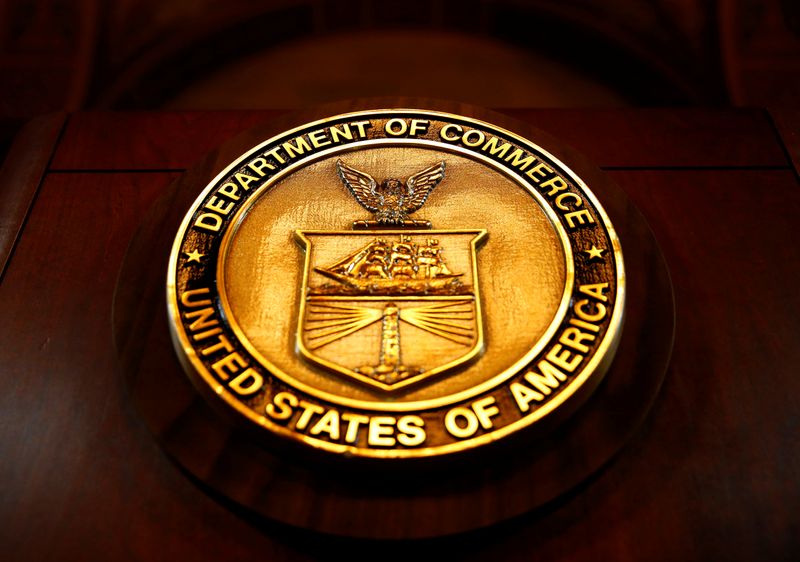By David Lawder, David Shepardson and David Brunnstrom
WASHINGTON (Reuters) -The Biden administration said Thursday it banned U.S. imports of a key solar panel material from Chinese-based Hoshine Silicon Industry Co, but stopped short of imposing a ban on all imports of silica from Xinjiang and said the action would not harm U.S. clean energy goals.
The Commerce Department separately added five Chinese entities to the U.S. economic blacklist over forced labor allegations in Xinjiang -- including Hoshine. The White House cited the G7's recent pledge to clean up the global supply chain as part of its actions.
Homeland Security Secretary Alejandro Mayorkas said the import bans on polysilicon and solar products made with forced labor would not hamper the Biden administration's clean energy goals.
"Our environmental goals will not be achieved on the backs of human beings in a forced labor environment," Mayorkas said at a press briefing. "We're going to root out forced labor wherever it exists."
The import ban covers products made overseas that use Hoshine materials, including any solar panels produced abroad with polysilicon from Hoshine.
Chinese Foreign Ministry spokesman Zhao Lijian, reacting to earlier reports of the U.S. action, said on Thursday that China would take "all necessary measures" to protect its companies' rights and interests.
Hoshine Silicon Industry said on an interactive investor platform that it backed the Chinese foreign ministry's reaction, adding that the firm does not export industrial silicon to the United States directly and the impact on its business would be limited.
Asked whether the Hoshine ban could be expanded into a region wide ban on all polysilicon from Xinjiang, Mayorkas and CBP officials downplayed any similarities to the agency's recent region-wide import bans on Xinjiang-produced cotton and tomato products over forced labor.
Ana Hinojosa, CBP's executive director for trade remedy law enforcement, said any expansion would depend on the substantiation of evidence that forced labor is being used.
Hinojosa said CBP identified $6 million of direct imports from Hoshine and $150 million of downstream products using Hoshine materials over the past 2.5 years.
The United States is also restricting U.S. exports of "commodities, software, and technology" to Hoshine, three other Chinese firms and the paramilitary Xinjiang Production and Construction Corps (XPCC), saying they were involved with the forced labor of Uyghurs and other Muslim minority groups in the western Chinese region.
Representative Dan Kildee, a Democrat active on trade issues, said the announcement was an "important signal of the administration's intent to enforce the law and as a first step." He said he expects other companies in Xinjiang producing silica will likely be subject to further enforcement actions.
The White House said the entities' practices ran counter not only to American values but also tipped the scales against U.S. workers "by exploiting workers and artificially suppressing wages."
John Smirnow, general counsel and vice president of market strategy at the Solar Energy Industries Association, the main U.S. solar industry association, said the group fully supported the Biden administration's move.
"The fact is, we do not have transparency into supply chains in the Xinjiang region, and there is too much risk in operating there," Smirnow said.
Polysilicon analyst Johannes Bernreuter with Germany-based Bernreuter Research said the CBP order could have a broad impact on the U.S. solar industry, noting that the world's top eight polysilicon manufacturers, which produced more than 90% of the solar-grade polysilicon output in 2020, have all been mentioned by Hoshine as customers.
"That means they source at least some of their silicon metal needs from Hoshine. Solar panel importers into the U.S. have to prove that the polysilicon for their panels was not made with any silicon metal from Hoshine," Bernreuter said.
The Washington-based Peterson Institute for International Economics said in a report on Thursday that China accounts for nearly half the global production of polysilicon.
'PROVE IT'
The new measures are the latest in a series of steps under President Joe Biden to secure U.S. supply chains in the face of allegations of rights abuses in China, and also the growing economic challenges posed by the United States' top geopolitical rival.
Beijing has dismissed accusations of genocide and forced labor in Xinjiang as lies.
The three other companies added to the Commerce Department's blacklist were Xinjiang Daqo New Energy (NYSE:DQ) Co, a unit of Daqo New Energy Corp; Xinjiang East Hope Nonferrous Metals Co, a subsidiary of Shanghai-based manufacturing giant East Hope Group; and Xinjiang GCL New Energy Material Co, part of GCL New Energy Holdings Ltd.
Several of the companies are major manufacturers of monocrystalline silicon and polysilicon used in solar panel production.
Xinjiang Daqo New Energy Co, in an email to Reuters, said it had "zero tolerance" towards forced labor, and does not directly sell or buy from the United States so there would be no "significant impact" on its business.
The other companies or their parent firms, including XPCC, did not reply to requests for comment, or could not be reached.

Separately, the Senate Foreign Relations Committee advanced the Uyghur Forced Labor Prevention Act to the full Senate on Thursday. Proposed by Republican Senator Marco Rubio and Democratic Senator Jeff Merkley, the bill - should it become law - would ban all products from Xinjiang unless importers could show they were not produced with forced labor.
"This is slavery. Simple as that," Rubio told the committee. "American companies argue that their supply chains are clean, and what this bill says is: prove it."